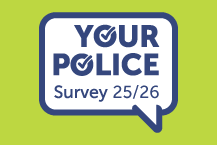Stop and search
Police Scotland uses Stop and Search as an operational policing tactic. This is for the prevention, investigation and detection of crime.
The intention is to keep people safe and improve community wellbeing.
Police Scotland recognises that stopping and searching members of the public is an intrusion into their personal liberty and privacy. We're committed to making sure it is done in a manner that is lawful, proportionate and accountable.
Whilst carrying out the stop and search of a person, officers will act in accordance with the Code of Practice on the use of stop and search.
It will be carried out using Police Scotland’s core values of fairness, integrity and respect.
Police Scotland will make sure that an individual’s rights are upheld according to the Human Rights Act 1998 and the Equalities Act 2010.
Police powers of stop and search
Police powers of stop and search are used when a police officer reasonably suspects you to be in possession of an illegal or harmful item.
In Scotland, the Code of Practice on the use of stop and search governs all situations where officers stop and search a person.
Officers must have a specific reason to carry out a search. It must be carried out using a specific statutory power. An officer cannot search you without a specific reason even with your consent.
An officer can search:
- You and your clothes
- Anything you are carrying, such as a bag or wallet
- The vehicle you are travelling in (where applicable).
For a list of Statutory Powers of Search, associated legislation and Statutory Powers to require the surrender of items visit the List of Statutory Powers document.
Your rights
Officers will act with integrity at all times and treat you with fairness and respect.
You will not be stopped and searched because of your age, sex, ethnic background or religion.
Officers should explain why they have stopped you. Before any search, they should explain what they are looking for.
Being stopped by the police does not mean that you are under arrest. However, you will need to stay with the officer until they have completed the search.
After the search officers should provide you a receipt for the search. This should contain information about your rights and how you can access a copy of your stop and search record.
You will not get a criminal record unless you are convicted of an offence. Any personal information collected will be kept for police purposes. It will then be destroyed after three years.
Download the leaflet about stop and search
More information
Code of practice on the use of stop and search
HMICS Audit and Assurance Review of stop and search: phase 2
A Guide to stop and search in Scotland
Stop and search in Scotland: What you need to know - A guide for children and young people
PDF files on this page require a PDF reader, such as the free Adobe Acrobat Reader (download).






